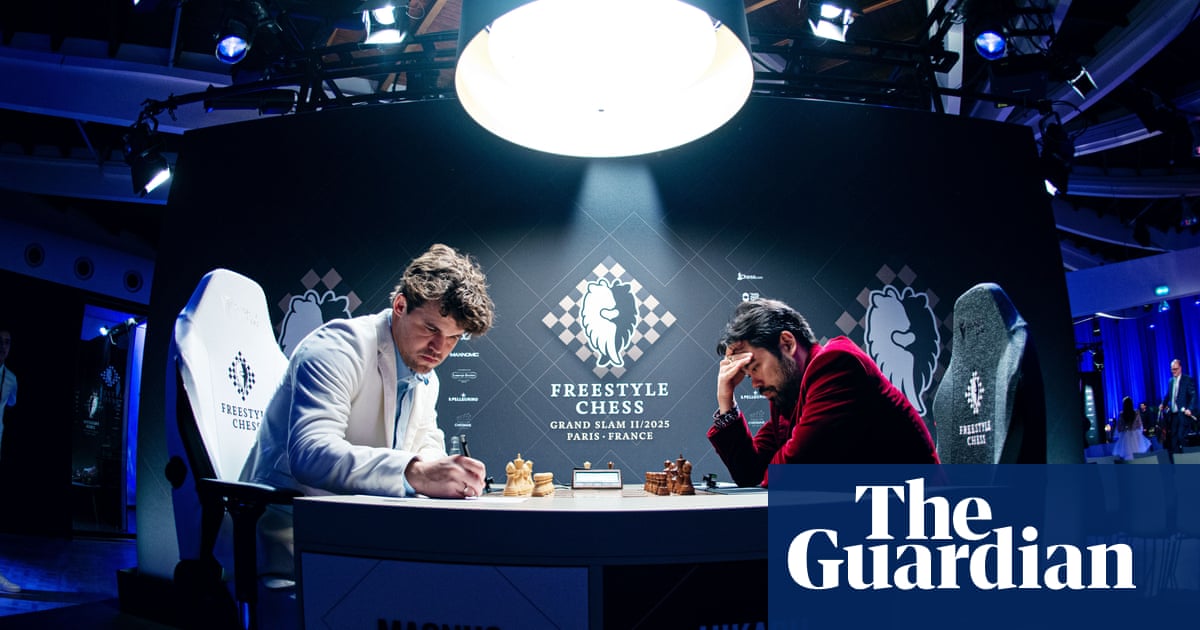Magnus Carlsen, the world No 1, scored a low-key triumph on Monday when he won the Paris leg of the $3.75m Freestyle Grand Slam by defeating his old rival and world No 2, USA’s Hikaru Nakamura, by 1.5-0.5 in the final. It was patient attrition over the two games, worthy of a place in the Carlsen-David Howell book Grind like a Grandmaster.
The decisive first game had some technical errors, which the Norwegian described almost apologetically in his post-game interview. The rematch was more routine as the 34-year-old simplified to his goal of a drawn rook endgame and a move-40 handshake.
Carlsen now has the overall lead in the five-leg Grand Slam which continues later in the year at Las Vegas, Delhi and Cape Town.
Earlier, he displayed his creativity when he gave up his queen for three minor pieces in his quarter-final, and his versatility and his continuing hunger for more chess when, his day’s work done in Paris, he took part in chess.com’s weekly Titled Tuesday and made a clean sweep of all 11 games, a rare feat which he has achieved twice previously, winning with an unbeaten 11/11.
The openings in Freestyle are a treacherous swamp, where careless play can lead to a lost position within a dozen moves. Relevant experience helps, though. Freestyle has 960 different starting positions, but there have been cases where one of the 960 appeared in a previous tournament, and a GM has remembered it.
Some time in the first 20 or so moves, a Freestyle position often becomes recognisably similar to normal chess and the players can use their previous knowledge effectively. In Carlsen’s Freestyle games, he spots this metamorphosis and transformation faster than his rivals, and that is one secret of his continued success.
A negative at Paris was the failure of the four Indian players who have dominated classical chess in recent years. Only Arjun Erigaisi, who remained true to his attacking style and emerged in fifth place, did well, while Gukesh Dommaraju, the 18-year-old classical world champion, did worst, finishing 11th out of 12.
What happens to the 2025 Freestyle Grand Slam in the coming months remains to be seen. Its third leg, scheduled for New York in late July, has been moved to Las Vegas and reduced from eight days to five, allowing two games a day in the interests of publicity. This means a faster time limit, from slow classical chess, as championed by Carlsen, to one-hour rapid games.
The change may also reflect the worsened economic climate. The Grand Slam series, which was projected to break even with the help of new trading partners by 2026, is financially backed by a $12m investment from the New York based venture capitalist firm Left Lane Capital, which is privately quoted but is still susceptible to market downturns and recessions. The pressures for Freestyle to achieve faster profitability, and wider support among the chess public and media, are increasing.
Ju Wenjun, the holder, won four games in succession against her demoralised challenger, Tan Zhongyi, to score a 6.5-2.5 victory in the $500,000 Women’s World Championship match in Chongqing. Game seven was Tan’s nadir as she allowed her a8 black bishop to be entombed by her own c6 pawn and a c5 white knight. Ju needed just a draw in Wednesday’s ninth game (of 12) to take the crown for the fifth time in her career.
Ju has now equalled the title totals of Nona Gaprindashvili and Maia Chiburdanidze, both of Georgia, who each won five crowns between 1962 and 1988. The all-time record holder remains Vera Menchik, a Czech who lived most of her life in London. Menchik won eight titles between 1927 and 1939 before being killed by a German V1 bomb at her Clapham home in 1944.
Shreyas Royal, England’s youngest ever grandmaster, scored his best performance so far in 2025 when he totalled 6.5/9 at the Reykjavik Open after sharing the lead two rounds from the finish. It brought a pairing with Iran’s world No 31, Parham Maghsoodloo, which Royal lost in 17 moves due to 9…Bxc3+? (9..d6!) allowing the top seed’s 12 Ba3! with decisive threats to d6.
after newsletter promotion
Nigel Short, the 1993 world title challenger, is making a rare competitive appearance this week in the Bangkok Open, where his third round win started with the Grand Prix Attack and led to a devastating assault on his opponent’s king.
England swept the board at the European Senior over-50 and over-65 Championships at Swidnica, Poland, last weekend, winning three team golds, one team bronze, and 14 individual medals. Both England 50+, led by Michael Adams, and England 65+, headed by John Nunn, won every match and neither lost a single game.
Such a feat would normally rank much higher in this column, but entries for the event were low both in quality and quantity. The European Seniors were staged only two months after the World Seniors in Prague, a popular venue, while many seniors have been deterred by Fide’s overzealous Fair Play anti-cheating officials, which sparked a public rebuke by Malcolm Pein in Chess magazine.
BBC Two’s Chess Masters: The Endgame reaches episode seven (of eight) on Easter Monday at 8pm. Audience numbers, supplied by Broadcast, remain rock solid at 600,000, 5% of the viewing audience, and indicative of a significant loyal fan base.
Next Monday’s episode will include an appearance by Bodhana Sivanandan, the Harrow 10-year-old who has become globally famous. Sivanandan is likely to take on all six remaining contestants simultaneously, a feat which will be familiar to her. Here is how, at age eight, she defeated Harrow Chess Club 5-1.
What do retired grandmasters do? One answer, as explained here by GM Jonathan Levitt, is to write song lyrics about Bobby Fischer and Boris Spassky.
3968: 1…Rf4! wins with the threat 2…g3 and 3…Qh2 mate. If 2 Qc3 Qh4 3 Qc8+ Kh7 and White has no defence to 4…g3.
